#black liberation
Text
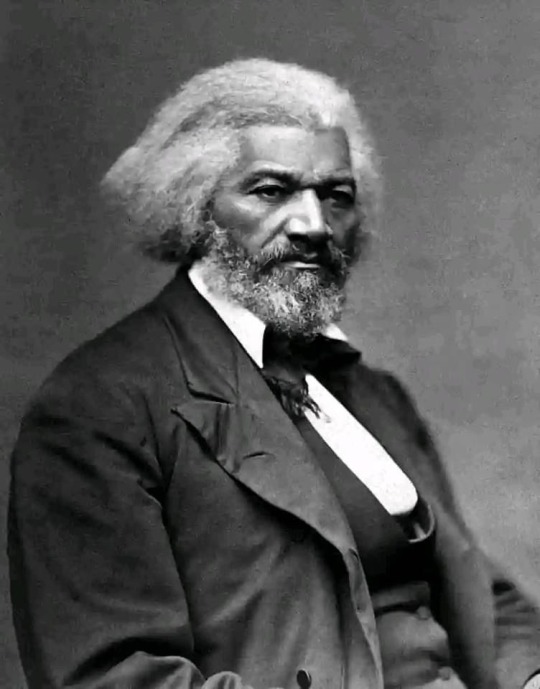
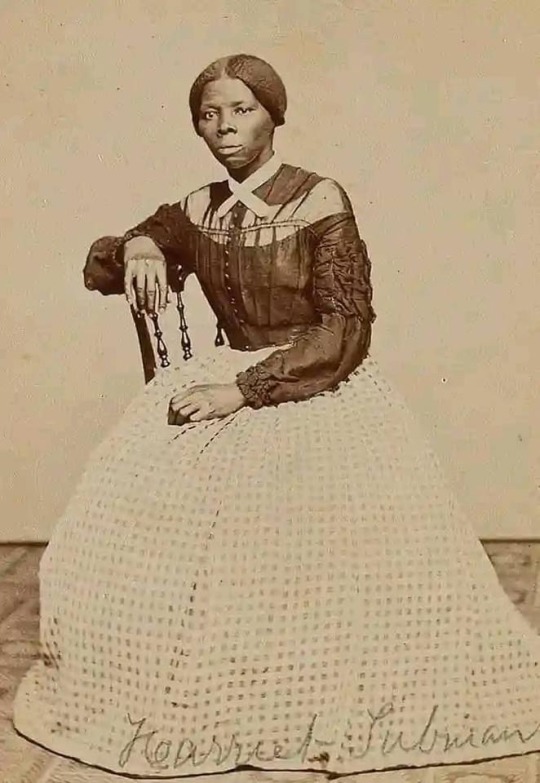
(1868) LETTER FROM FREDERICK DOUGLASS TO HARRIET TUBMAN
Rochester, August 29, 1868
Dear Harriet: I am glad to know that the story of your eventful life has been written by a kind lady, and that the same is soon to be published. You ask for what you do not need when you call upon me for a word of commendation. I need such words from you far more than you can need them from me, especially where your superior labors and devotion to the cause of the lately enslaved of our land are known as I know them.
The difference between us is very marked. Most that I have done and suffered in the service of our cause has been in public, and I have received much encouragement at every step of the way. You, on the other hand, have labored in a private way. I have wrought in the day – you in the night. I have had the applause of the crowd and the satisfaction that comes of being approved by the multitude, while the most that you have done has been witnessed by a few trembling, scarred, and foot-sore bondmen and women, whom you have led out of the house of bondage, and whose heartfelt, “God bless you,” has been your only reward.
The midnight sky and the silent stars have been the witnesses of your devotion to freedom and of your heroism. Excepting John Brown – of sacred memory – I know of no one who has willingly encountered more perils and hardships to serve our enslaved people than you have. Much that you have done would seem improbable to those who do not know you as I know you. It is to me a great pleasure and a great privilege to bear testimony for your character and your works, and to say to those to whom you may come, that I regard you in every way truthful and trustworthy.
Your friend,
Frederick Douglass
101 notes
·
View notes
Text
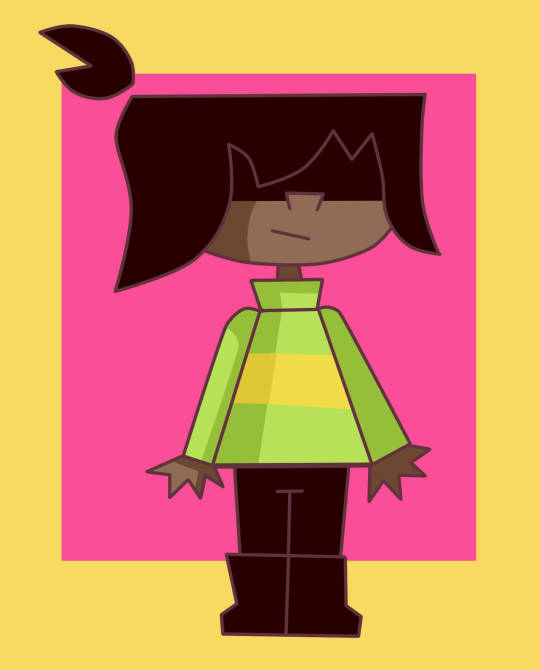
kris the hooman
#hooman#deltarune#undertale#undertale fanart#undertale fandom#deltarune fanart#deltarune art#kris deltarune#kris dreemurr#kris the hooman#black liberation#blacklivesmatter#black tumblr#black person
28 notes
·
View notes
Text
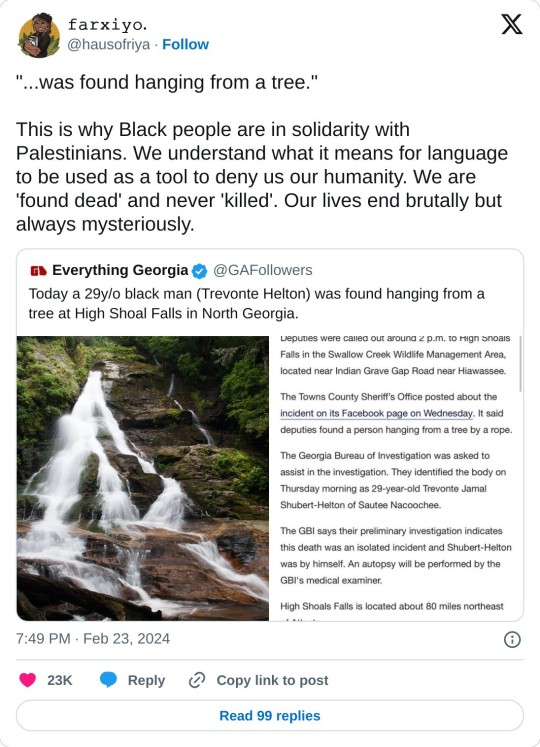
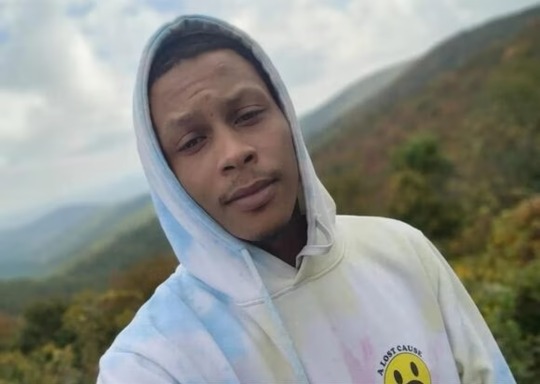
Trevonte Helton, a 29 year old Black man, "was found hanging from a tree at High Shoal Falls in North Georgia." This man was murdered, and their quick eagerness to call this an "isolated" incident is just horrifying.
#feminist#social justice#feminism#current events#current news#atlanta#georgia#antiblackracism#racism#dehumanizing language#global news#world news#united states#palestinian liberation#black liberation#black lives matter#hate crime tw#hate crime#tw murder
4K notes
·
View notes
Text
Long-term Reparations for a Black Family
The below write-up is from a previous post I made for Courtney but I copy and pasted it as I'm fatigued and it's still relevant.
For those of you who know my blog, you know my friend Courtney needs support. The reality is it is unlikely that that will change soon given that she is a disabled single mom providing for 3 kids with a low-wage job. I love her dearly and she genuinely struggles every day. I want to make the world better for her. I talk often about the power of community care. Courtney needs this consistently. If you are a non-Black person who is financially secure, please consider giving her reparations every month or biweekly. I will put her paylinks below. To work towards and as an accomplice of Black liberation, you need to be committed.
This part is not copy pasted but new.
Currently, her family is struggling with food, getting their water on, and saving for next month's rent. They don't have water at the moment and her son has no clean underwear left. They really need the water back on. The sooner the better. They need 136 more to get the water. If you see this, please send a dollar if possible, or even 50 cents. Small donations add up. Give reparations consistently and commit, but if you can't do it consistently still help out when you can.
Cash.me/browni3mom
Venmo @courtney-reece-85
#Black Lives Mattter#Black liberation#mutual aid#reparations#community care#crowdfunding#crowdfund#community action#signal boost
1K notes
·
View notes
Text
Like halfway through "how Europe underdeveloped Africa" cause I decided I'd read/listen to it after I had a strong base on knowledge on African history and just holy fuck is he right about nearly everything so far.
Having learned about how extensive African trade was prior to the 18th century and how heavily most African kingdoms shifted in the 16th it's very clear that what he points out in the way the slave trade and the need to aquire firearms grew the European economies while near completely emptying out African economies and how the hard shift to European import goods after Europe had grow through the use of African slave labor and monopoly of trade routes is still a largely still at play in the era of neocolonialism.
The way that Walter Rodney not just points out that this is true, but the depth to which he covers a variety of African kingdoms, their economies, and cultural practices puts even some college level courses to shame while also showcasing the exact ways in which some of these stronger or more expansive kingdoms like the Ashanti, oyo, borno, Kongo, and Benin kingdoms had explicitly tried everything to get guns through any other trade and how the Ashanti, merina, Ethiopian, Burundi Benin kingdoms sought our education and scholars to begin industrialization and the systematic way in which Europeans and Americans prevented that is just, well it's damming.
It's a continuing reminder how from the first stage of European expansion and control they had precisely zero good intentions for the peoples of Africa. That Europe saw Africa as nothing more than a way to grow itself, it's institutions and improve its economies by depriving Africa of labor, materials and freedom which is true to this day, most starkly in the Congo but true across the whole region.
But while the book shows the crimes of Europeans without sugar coating, it also doesn't glorify the African leaders and more importantly those that became collaborative with European despitism. It also does not abide by the word games the European powers like to play and goes in depth to the way Europeans had no actual interest in ending slavery, and that while invading the various kingdoms and communities to "end slavery" the created some of the most brutal slave conditions on this side of the globe, not just in Leopolds Congo but in French forced labor camps and British controlled regions, with the Portuguese being particularly up front about it.
Truly a shame that like most other black radicals Rodney was murdered so young. The rarity to which black radicals even get to 40 shows how desperately capitalist and white supremist try to prevent even the slightest push back from black voices. It also makes clear how much we all need to know this stuff, from debois's black reconstruction to nkrumah's neoimperialism these books give a great understanding of the past and the precise way in which we arrived to the current situation.
I pray that with the new scramble for Africa that is unfolding in front of our very faces, the genocides in the Congo, and Sudan, and the way in which these interlock with the genocide of Palestinians, that we all take the time to properly read and reflect so that we may properly organize and fight back for a fully free and sovereign Africa and Palestine and a world free from white supremacy.
#black liberation#colonization#politics#indigenous liberation#world of the oppressed#pan african#the colonized#How Europe underdeveloped Africa#walter rodney
623 notes
·
View notes
Text

Happy black history month ya'll!!!
#black history month#black lives still matter#black lives are important#black lives fucking matter#black lives have always mattered#black lives matter#black liberation#black community#poc artist#blm#my art 2024#black power#blm is not a terrorism group#black is beautiful#black is divine#artists on tumblr#black artists#artists of color#black artists on tumblr#fluffytimearts#my artwork#my art#yes yes I know another artstyle change fuck off--#signal boost#chibi art#chibi style#black history month 2024
521 notes
·
View notes
Text







from @/pslnational
#mlk jr#mlk#mlk day#revolution#quotes#socialism#anti capitalism#instagram#black lives matter#civil rights#protest#vietnam#economics#washington dc#united states#black liberation
433 notes
·
View notes
Text
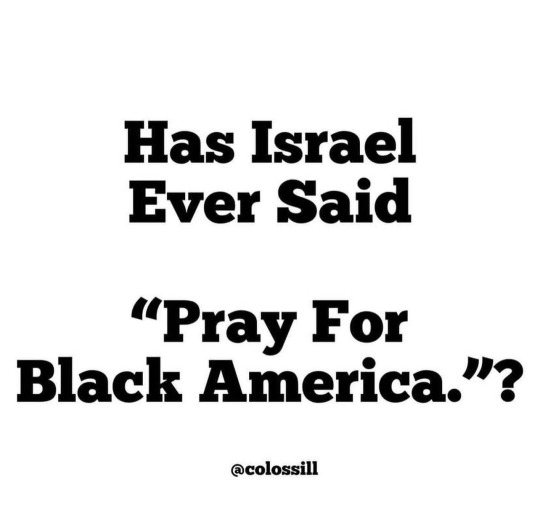

643 notes
·
View notes
Text
There is a long long conversation that I want to participate in and highlight about race and the Palestinian liberation struggle because 4 things are true:
1. Hypervisibility is not a privilege of the exploited. It's a harrowing experience to be observed perpetually by a global audience as you resist your own murder. Black people globally are very familiar with this experience. The Palestinian people are both hypervisible and dehumanized to such an extent that their national cause has been used rhetorically by many who are willing to watch and cry and throw pennies but not provide actual support for their safety, which feels very familiar to Black people.
2. Nonblack people globally on average do not recognize Black suffering as human suffering because Black life isn't recognized as human life by the averqge nonblack person. If that feels accusatory, it is. Think before responding to that, ask yourself some questions before you ask me a half baked one because by ethnicity, nationality, status in the eyes of civil society and so on, all nonblack people benefit from the dehumanizing of Black people.
3. Palestinians have used their hypervisibility for the benefit of the struggles of others even at their own expense, even at the risk of their lives, Palestinians have been insistent, for years, that their struggle is connected to the suffering of the whole world and they've been extremely correct.
4. Antiblackness is and always will be a factor in how nonblack people are treated collectively by the media gaze and how that manifests is actually significantly more complicated than "nonblack = positive, Black = negative " because proximity to and empathy for Black liberation is a factor in the treatment of nonblack groups, and when you put yourself out there on your own behalf and the behalf of Black people, your humanity becomes conditional to empire. Empathy for Black struggle, let alone solidarity with Black struggles for liberation, makes targets.
#antiblackness#hypervisibility#Necropolitics#ontology#black liberation#Palestine#the DRC#sudan#south sudan
468 notes
·
View notes
Text
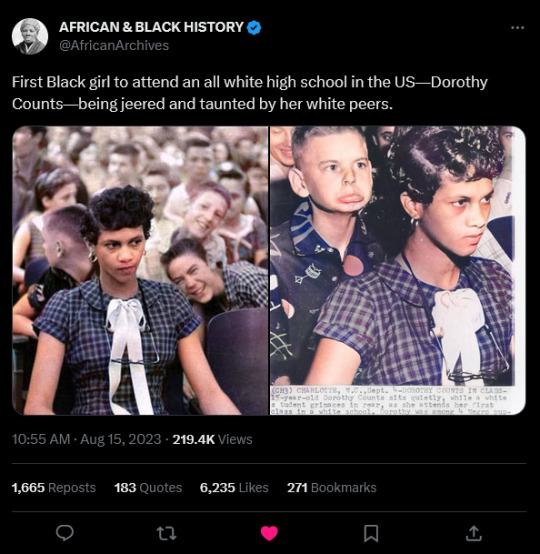
#blm#discrimination#defund the police#bipoc#black lives matter#civil rights#black lives fucking matter#lgbtqia#black lives movement#black lives have always mattered#black lives are important#black history#lgbtq#black liberation#african american history#civil rights movement#black community#civil war#civil liberties#black history month#black pride#black culture#black archives#black excellence
777 notes
·
View notes
Text
A symbol of resistance
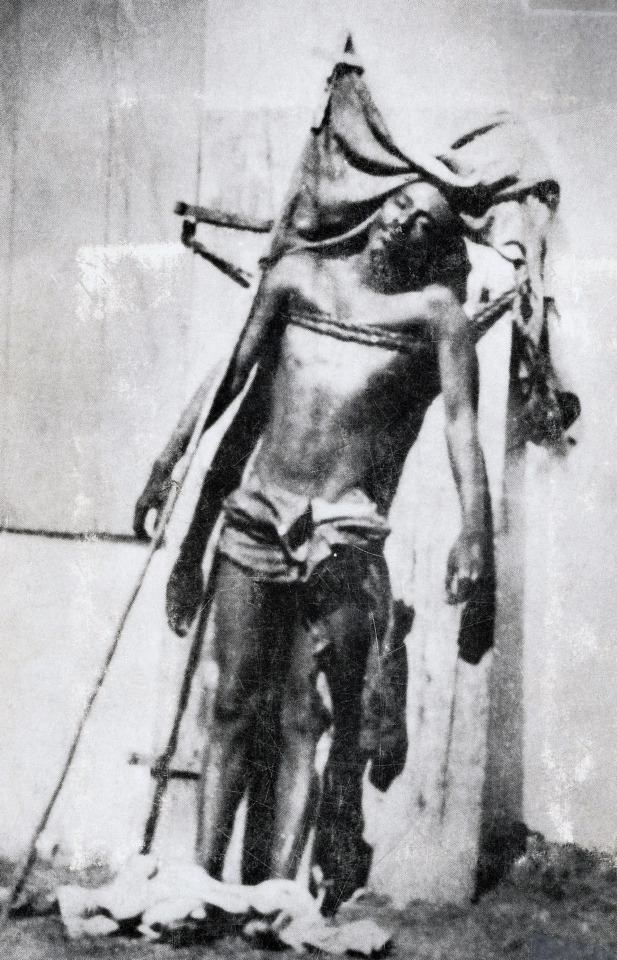
Charlemagne Péralte
Charlemagne Péralte was a Haitian resistance leader shot by U.S. forces during the 1915 occupation.
After Péralte's death, U.S. troops displayed his body posed in a way that resembled a crucifixion – tied upright with a Haitian flag draped over him. This photo was intended to intimidate the Haitian population.
However, it backfired. The image resonated with Haitians, making Péralte a martyr and a symbol of resistance. There's even a famous Haitian painting called "The Crucifixion of Charlemagne Péralte for Freedom."
#resistance#Charlemagne Peralte#Ayiti#Hayti#Haiti#U.S. Occupation#martyr#Hero#The Crucifixion of Charlemagne Peralte#african diaspora#History#EvilisWinning#black liberation#1915
268 notes
·
View notes
Text
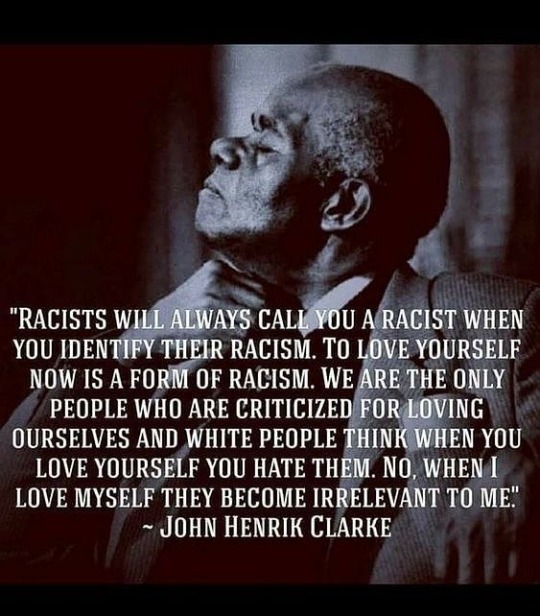
55 notes
·
View notes
Text
545 notes
·
View notes
Text

#feminist#social justice#malcom x#black lives matter#black liberation#black history#united states#us politics
1K notes
·
View notes
Text
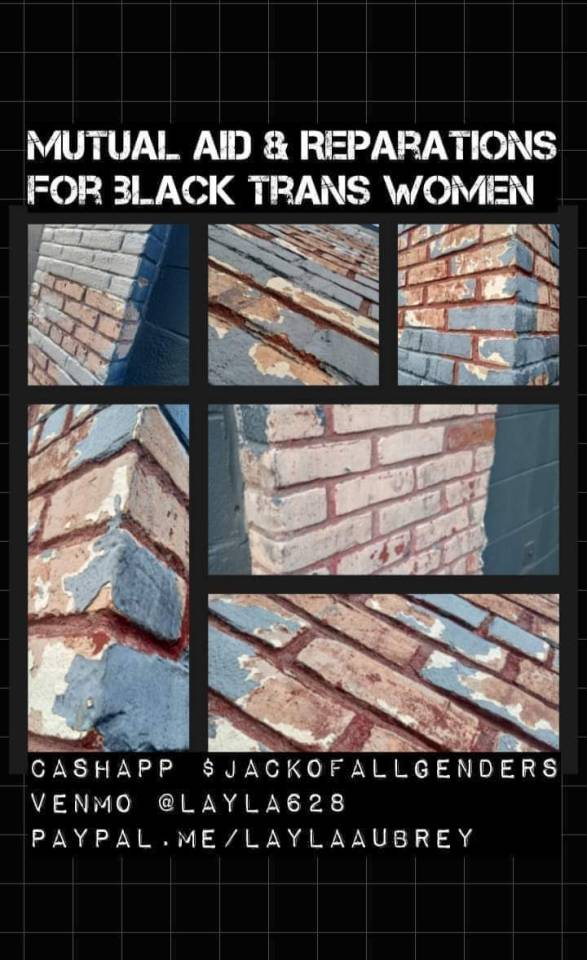
Heyyyy Besties! One of my long term Facebook friends is an unhoused Black trans woman who does mutual aid organizing for Black trans women. She raises funds and redistributes them to a list of people she helps who are all Black and transfemme. She's done this every month for 3 years! Last month she hit a record in terms of redistributing and hit 1470 dollars, but she has a bunch of recipients so it doesn't go as far as people expect. Please reblog, I see a lot of people talk about supporting Black trans women but I wanna see action.
#mutual aid#black liberation#black trans women#community care#unhoused#trans mutual aid#trans crowdfund
1K notes
·
View notes
Text
black & palestinian solidarities
if you support black liberation but are unsure of your stance on palestinian resistance, here’s a reminder that they are deeply intertwined. after the 1917 balfour declaration by the british government announcing the first support for a zionist state in palestine, zionism and israeli occupation of palestine have followed similar ideologies and practices to white supremacist settler colonial projects, so solidarity between black and palestinian communities has grown over time, seeing each other as fellow anti-imperialist and anti-racist struggles. (if you get a paywall for any of the sources below, try searching them in google scholar.)
palestinians have been inspired by and shown support for black liberationist struggles as early as the 1930s, when arabic-language newspapers in palestine wrote about the struggle by black folks in the united states and framed it as anti-colonial, as well as opposing the 1935 invasion by fascist italy of ethiopia, the only independent black african state at the time. palestinian support for black struggles grew in the 1960s with the emergence of newly-independent african states, the development of black and third world internationalisms, and the civil rights movement in the united states. palestinian writers have expressed this solidarity too: palestinian activist samih al-qasim showed his admiration for congolese independence leader patrice lumumba in a poem about him, while palestinian poet mahmoud darwish’s “letters to a negro” essays spoke directly to black folks in the united states about shared struggles.
afro-palestinians have a rich history of freedom fighting against israeli apartheid, where they face oppression at the intersections of their black and palestinian identities. some families trace their roots back hundreds of years, while others came to jerusalem in the nineteenth century from chad, sudan, nigeria, and senegal after performing the hajj (the islamic pilgrimage to mecca) and settled down. still others came to palestine in the 1940s specifically to join the arab liberation army, where they fought against israel’s ethnic cleansing of palestinians during the 1948 nakba (“catastrophe”). afro-palestinian freedom fighter fatima bernawi, who was of nigerian, palestinian, and jordanian descent, became, in 1967, the first palestinian woman to be organize an operation against israel, and subsequently the first palestinian woman to be imprisoned by israel. the history of afro-palestinian resistance continues today: even as the small afro-palestinian community in jerusalem is highly-surveilled, over-policed, disproportionately incarcerated, and subjected to racist violence, they continue to organize and fight for palestinian liberation.
black revolutionaries and leaders in the united states have supported the palestinian struggle for decades, with a ramp-up since the 1960s. malcolm x became a huge opponent of zionism after traveling to southwest asia and north africa (SWANA), publishing “zionist logic” in 1964, and becoming one of the first black leaders from the united states to meet with the newly formed palestine liberation organization. the black panther party and the third world women’s alliance, a revolutionary socialist organization for women of color, also supported palestinian resistance in the 1970s. writers like maya angelou, june jordan, and james baldwin have long spoken out for palestinians. dr. angela davis (who received support from palestinian political prisoners when she was incarcerated) has made black and palestinian solidarity a key piece of her work. and many, many more black leaders and revolutionaries in the united states have supported palestinian freedom.
while israel has long courted relationships with the african union and its members, there has been ongoing tension between them since at least the 1970s, when all but four african states (malawi, lesotho, swaziland, and mauritius) cut off diplomatic ties with israel after the 1973 october war. while many of those diplomatic relationships were reestablished in subsequent decades, they remain rocky, and earlier this year, the african union booted an israeli diplomat from their annual summit in addis ababa, ethiopia, and issued a draft declaration on the situation in palestine and the middle east that expressed “full support for the palestinian people in their legitimate struggle against the israeli occupation”, naming israeli settlements as illegal and calling for boycotts and sanctions with israel. grassroots organizations like africa 4 palestine have also been key in the BDS (boycott, divestment, sanctions) movement.
in south africa, comparisons between israel and south african apartheid have been prevalent since the 1990s and early 2000s. israel historically allied with apartheid-era south africa, while palestinians opposed south african apartheid, leading nelson mandela to support the palestinian liberation organization as "fighting for the right of self-determination"; over the years his statements have been joined by fellow black african freedom fighters like nozizwe madlala-routledge and desmond tutu. post-apartheid south africa has continued to be a strong ally to palestine, calling for israel to be declared “apartheid state”.
black and palestinian solidarities have continued into the 21st century. palestinian people raised money to send to survivors of hurricane katrina in the united states in 2005 (which disproportionately harmed black communities in new orleans and the gulf of mexico) and the devastating earthquake in haiti in 2010. in the past decade, the global black lives matter struggle has brought new emphasis to shared struggles. prison and police abolitionists have long noted the deadly exchange which brings together police, ICE, border patrol, and FBI agents from the united states to train with soldiers, police, and border agents from israel. palestinian freedom fighters supported the 2014 uprising in ferguson in the united states, and shared strategies for resisting state violence. over a thousand black leaders signed onto the 2015 black solidarity statement with palestine. the murder of george floyd by american cops in 2020 has sparked further allyship, including black lives matter protests in palestine, with organizations like the dream defenders making connections between palestinian and black activists.
this is just a short summary that i came up because i've been researching black and asian solidarities recently so i had some sources on hand; there's obviously so much more that i haven't covered, so please feel free to reblog with further additions to this history!
#free palestine#black liberation#black and palestinian solidarity#black and asian solidarity#original
633 notes
·
View notes